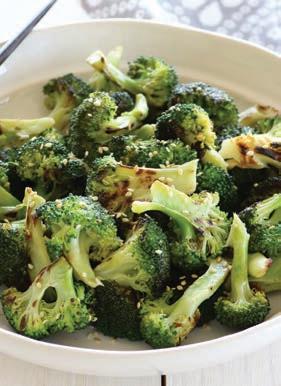
3 minute read
Dark green leafy vegetables
Eat Right; Breathe Right
By Lee Ross WI Staff Writer
The diagnosis of emphysema came to Dora Ayo just days before her fortieth birthday. Until then, her occasional coughing and wheezing bouts were attributed to a return of childhood asthma – and formidable cigarette habit that spanned two decades. With the diagnosis and a managed care protocol that included input from a dietician, Ayo found that many of the foods she enjoyed contributed to breathlessness just as cigarettes once had. And like many of the roughly 65 million people around the world living with moderate or severe COPD, or chronic obstructive pulmonary disease, -- a group of lung diseases that makes it harder to breathe, leaving behind her favorite foods proved daunting.
“My physician made it clear that too much salt and processed foods would exacerbate my condition and cause flareups. It went in one ear and out the other because I believed I could eat things in moderation and be okay,” Ayo told the Informer. “I learned the hard way that moderation for me quickly became gorging and left me struggling for air.”
Tobacco use is the primary cause of COPD in the United States, but air pollutants at home (such as secondhand smoke and some heating fuels) and at work (such as dusts, gases, and fumes), and genetic predisposition also can cause COPD. Additionally, women are increasingly diagnosed with COPD at later and more advanced stages making treatment less effective. Once diagnoses are made, adhering to quality of life regimens, as prescribed by a physician is important.
Ayo says she now adheres to a strict diet to avoid flare ups. Here are some of the tips her physician provided of foods to avoid and help keep you breathing well.
SALT / SALT SUBSTITUTES
Eating too much salt could be a problem as it can cause the body to retain water, which can hinder breathing. Salt substitutes may be high in potassium, which could interact poorly with COPD medications.
COLD CUTS
Due to their nitrate content, cold cuts, ham, bacon, and hot dogs can worsen COPD symptoms. Similarly, chemicals like sulfites are often added to shrimp as preservatives to help retain their color. Sulfites can trigger a narrowing of bronchial passages in people with sensitive airways, causing major flareups.
DAIRY PRODUCTS
Milk can cause problems for some people with COPD because of the casomorphin, that naturally occurs in it and is believed to increase mucus production in the intestine. Many respiratory diseases, including COPD, are associated with increased mucus production from a similar type of gland in the lung during periods of inflammation.
Both fried foods and vegetables like broccoli, cauliflower, Brussels sprouts, and cabbage cause gas and bloating, which can make breathing difficult. Similarly, carbonated soft drinks produce gas and bloat and may cause breathing discomfort. HS 5 Maintaining a healthy lifestyle – including proper nutrition and the elimination of certain foods is critical to living well with COPD. / Courtesy photo
Check out the Congress Heights Wellness Space at the Alabama Avenue Giant for FREE nutrition and wellness classes open to the entire community!

Jillian Griffith, MSPH, RDN, LDN Whether you are concerned about diabetes, heart health, or just want to improve family meal times, nutritionist Jillian Griffith can answer your nutrition questions and help you make the best shopping choices for your family’s health and wellness. Schedule a personalized nutrition consultation or request a store tour!

This spring, Jillian will launch a Sugar in Check program on diabetes prevention and What Can I Eat, a program for those navigating prediabetes and diabetes.
Register today at giantfood.com/nutrition or email jillian.griffith@giantfood.com for more information!





